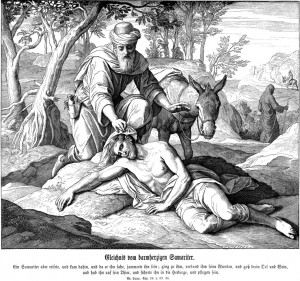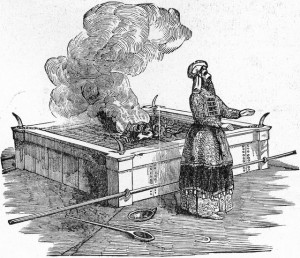====================
This sermon was preached on the Sixteenth Sunday after Pentecost, September 8, 2013, at St. Paul’s Episcopal Church, Medina, Ohio, where Fr. Funston is rector.
(Revised Common Lectionary, Pentecost 16 (Proper 18, Year C): Jeremiah 18:1-11; Psalm 139:1-5,12-17; Philemon 1-21; and Luke 14:25-33. These lessons can be read at The Lectionary Page.)
====================
 We are given three very challenging readings from Holy Scripture this morning. First, there is Jeremiah’s familiar, but radical, prophetic metaphor of God as a potter able to do with the nation of Israel what a potter does with a spoiled piece of work. Second, perhaps the oddest piece of New Testament literature, Paul’s personal letter to a man named Philemon returning a runaway slave whom Paul has converted to Christianity. And, lastly, Luke’s report of Jesus’ radical requirement that his followers must hate their possessions, their families, and even themselves. What I believe is common among these lessons is a call to radical transformation.
We are given three very challenging readings from Holy Scripture this morning. First, there is Jeremiah’s familiar, but radical, prophetic metaphor of God as a potter able to do with the nation of Israel what a potter does with a spoiled piece of work. Second, perhaps the oddest piece of New Testament literature, Paul’s personal letter to a man named Philemon returning a runaway slave whom Paul has converted to Christianity. And, lastly, Luke’s report of Jesus’ radical requirement that his followers must hate their possessions, their families, and even themselves. What I believe is common among these lessons is a call to radical transformation.
Let’s look first at the Gospel lesson. According to Luke, Jesus says to a great multitude of people, “Whoever comes to me and does not hate father and mother, wife and children, brothers and sisters, yes, and even life itself, cannot be my disciple.” It appears to have been Jesus’ intention to turn away any potential follower who might be half-hearted, or luke-warm; he was not willing to just let anyone come along. Jesus was not interested in “church growth.” But when Jesus says, “You cannot be my disciple,” we need to careful parse and understand what he is saying. He is not say, “I will not let you be my disciple.” The Greek is ou dunatai einai mou mathetes. The verb dunamai means “to be able to, to have power to” – from its root dunamis we get our word “dynamic.” Jesus is not saying he will prevent or stand in the way of such a person becoming a disciple; rather, Jesus is saying such a person is simply incapable of becoming a disciple. The blockage is in that person, not in Jesus.
Jesus goes on to illustrate what he means with two short parables which would have been within the experience and understanding of his listeners: a man counting the cost of building a tower and a king calculating the probability of success in going to war. These examples of what we might call “social calculus” give meaning to Jesus’ use of the word “hate” — and that’s what it is in Greek; in fact, “detest” might be an even better translation — and applying it to family, wealth, and even one’s own soul. Discipleship, as Jesus understands it, is complete, total, uncompromising. It includes counting the costs and considering what it means to set out on the path of discipleship; one cannot do so on the spur of the moment in a brief burst of enthusiasm without a thought where that path might end. Jesus’ use of “hate,” illustrated by stories where there are two possible courses of action, only one of which may chosen and that one must be chosen decisively, underscores that, for Jesus, full commitment means the severance of even potential commitment to any other possibility.
For us, as contemporary Christians, this Gospel faces us with the hard truth of what it means to follow Jesus; we must grapple with the reality that our Messiah is a radical, counter-cultural prophet. As my friend Presbyterian theologian Bruce Reyes-Chow puts it, in this Gospel Jesus calls us “to step into that space of faithfulness that Jesus calls ‘hate.'” (The Hardest Question) That’s really, really hard! His message and actions are not easy to follow, and they do not fit easily or comfortably into our 21st Century context. It is a call to radical transformation.
This was also the message of the Prophet Jeremiah with his deceptively folksy metaphor of a potter reworking a lump of clay.
A potter working with clay was an everyday occurrence in the ancient world. This is not an artisan working on an art piece that Jeremiah is describing. This is a merchant working on the rough and ready pots that were the everyday utensils of a typical Judean household, not perfect, not particularly attractive, but serviceable, useful to hold the grain, oil, and wine to sustain life, the jug to hold water, the bowl or plate from which to eat. God sends Jeremiah to the potters to watch him at this everyday commercial task, and as Jeremiah looks on, the potter decides that his work just isn’t going according to plan . . . and so he smashes the clay and destroys the pot that he is making. He begins again.
There was, in Jeremiah’s time, a conflict or tension between what has come to be called “temple theology,” which the religious leaders of the nation, the King and the priests, believed, and a “covenant theology” taught by the prophets. Temple theology taught that Israel was God’s chosen nations so that bad things would not happen to Israel; indeed, bad things could not happen because of the protection of God guaranteed by performance of the proper rituals and sacrifices in the temple. Covenant theology, on the other hand, was an understanding that God rewards obedience and punishes disobedience, that more than ritual sacrifice was required of God’s people, that fulfillment of the whole covenant, especially its social teachings of justice and care for the poor, the widowed, the orphan, and the stranger, was required.
God says to Jeremiah, “I can do with Israel what this potter has done with his clay.” The word “potter” spoken here by God is based on the verb, yatsar, “to fashion, form.” This is the verb used in Genesis 2:7 to describe God’s creative action when God took up a piece of wet clay and molded it into Adam, the human being. It is a reminder that humankind was formed for a purpose just the way the jugs and bowls and plates of the potter are formed for a purpose and, when that purpose is unfulfilled . . . . well, you understand.
Jeremiah’s prophecy is a call for repentance which includes the unequivocal warning that there are consequences for failing to honor God’s covenant and that those consequences can be severe. The people of God need to know that God’s actions toward them are not limited to the blessings of temple theology; they include the possible consequences of covenant theology, as well. It is a call, as all true calls for repentance are, to radical transformation.
And then we have the Letter to Philemon.
This one chapter letter, the shortest piece of literature in the Christian bible, may just be the most challenging. On its face, it’s just a letter sending a slave back to his master, and therein lies the difficulty.
In the ancient Greco-Roman world, anybody could become a slave for a variety of reasons — being captured in war, becoming unable to pay your own debts, being sold in to slavery by one’s own parents faced with bankruptcy. It is estimated that as much as 40% of the populace of the Roman Empire were slaves! Slaves were the property of their masters. They could be bought and sold at discretion; they could be expelled from their master’s demesne simply for being old or sick. They were often abused. Most important for our understanding of Paul’s letter to Philemon is that a master had the right to kill a slave when he or she ran away. It is not clear that Onesimus was a run-away, but that is the accepted understanding of this letter. Paul was dealing with a potential life or death matter.
Paul’s appeal to Philemon is to accept Onesimus back because, under Paul’s tutelage, Onesimus has become a Christians, as Philemon himself has become. Paul urges the master to accept the slave as his brother in Christ. What is troubling for us is that Paul does not demand that Philemon give Onesimus his freedom. What is troubling for us is that Paul says nothing about what Onesimus might want. From Philemon’s perspective Onesimus is a slave and a useless one at that. What Onesimus actually was, we are not told. We are never told what he thinks or feels.
As Holly Hearon, Professor of New Testament at Christian Theological Seminary, in Indianapolis, Indiana, says:
The letter to Philemon challenges us to discern, in and for Christ, what is the right thing to do. It would be easy if doing the right thing was, for example, taking out the garbage, or helping an elderly person cross the street. It is another when the right thing involves a radical transformation of social relationships: of learning to see people that time and experience have led us to view one way in a completely new way. It is another thing when this radical transformation of social relationships asks us to give up what we have come to view as our rights: to willingly let go of privilege. It is another thing when this letting go of privilege leads us to assume a relationship of kinship — of obligation — with those whom we have formerly viewed with suspicion because we now recognize that we are bound together in Christ. (Working Preacher)
So, again, the theme of the reading, the demand of the reading, is radical transformation.
In his Second Letter to the church in Corinth, Paul wrote, “If anyone is in Christ, there is a new creation: everything old has passed away; see, everything has become new!” (2 Cor. 5:17) In his letter to the Romans, he wrote, “Do not be conformed to this world, but be transformed by the renewing of your minds.” (Rom. 12:2a)
Radical transformation involves removing the barriers that prevent us from becoming Christ’s new creation, the things that prevent us from being renewed. Jesus told us to “hate” anything that stands in our way; simply put, that means letting go of those things. That’s easier said than done; in fact, on our own I don’t believe we can. The message of Jeremiah’s homely potter metaphor is that the One with the power to do so is not us, poor lumps of clay that we are; it is God. In Alcoholics Anonymous the first two of the Twelve Steps are:
1. We admitted we were powerless over alcohol — that our lives had become unmanageable.
2. Came to believe that a power greater than ourselves could restore us to sanity.
That is a statement of the very core of Jeremiah’s metaphor: We’re powerless; God isn’t. We do not have the power in ourselves to follow Jesus, but with God’s grace we can.
Being a follower of Jesus and living a life of radical transformation requires a commitment to allow God to continually work on transforming us, and that commitment must be full including severing every potential commitment to any other possibility. Radical transformation does not happen overnight; it takes time, it takes persistence, it takes faith. It takes a willingness to let go and an inner desire to allow the Potter to remake us into the creation God intends us to be.
And when we are transformed, when we are that new creation, we can turn to God and say with the Psalmist: “I will thank you because I am marvelously made; your works are wonderful, and I know it well.” Amen.
====================
A request to my readers: I’m trying to build the readership of this blog and I’d very much appreciate your help in doing so. If you find something here that is of value, please share it with others. If you are on Facebook, “like” the posts on your page so others can see them. If you are following me on Twitter, please “retweet” the notices of these meditations. If you have a blog of your own, please include mine in your links (a favor I will gladly reciprocate). Many thanks!
====================
Father Funston is the rector of St. Paul’s Episcopal Church, Medina, Ohio.
 In last week’s sermon I talked about the first three prophetic visions God reveals to Amos: a plague of locusts devouring the crops of ancient Israel, a catastrophic fire destroying everything in the nation, and the plumb line set in the midst of the nation’s people demonstrating that they were not upright. This week Amos is shown a fourth prophetic vision.
In last week’s sermon I talked about the first three prophetic visions God reveals to Amos: a plague of locusts devouring the crops of ancient Israel, a catastrophic fire destroying everything in the nation, and the plumb line set in the midst of the nation’s people demonstrating that they were not upright. This week Amos is shown a fourth prophetic vision.  The nation’s legal system is corrupt; justice is for sale to the highest bidder. The guilty go free while the innocent suffer and die. The rich are crushing the poor. The affluent, the 1%-ers, are living a lavish life, with their costly perfumes and cosmetics, and their vacation homes with expensive furnishings, pleasure palaces where they can throw extravagant parties with music in every room. They revel in sexual debauchery of all sorts, but try to enforce a puritanical moral code on the rest of society. The poor are at the mercy of predatory lenders who exploit vulnerable families. The rich have more than enough to eat and to waste, while the poorest in the society go hungry. And government and religious leaders not only allow this to happen, they help it happen.
The nation’s legal system is corrupt; justice is for sale to the highest bidder. The guilty go free while the innocent suffer and die. The rich are crushing the poor. The affluent, the 1%-ers, are living a lavish life, with their costly perfumes and cosmetics, and their vacation homes with expensive furnishings, pleasure palaces where they can throw extravagant parties with music in every room. They revel in sexual debauchery of all sorts, but try to enforce a puritanical moral code on the rest of society. The poor are at the mercy of predatory lenders who exploit vulnerable families. The rich have more than enough to eat and to waste, while the poorest in the society go hungry. And government and religious leaders not only allow this to happen, they help it happen.  Independence Day is one of the few secular holidays to have lessons of its own in both the Eucharistic and Daily Office Lectionaries of the Episcopal Church. There is a set of lessons in the regular Daily Office schedule of readings for today, as well, and I am intrigued that the way the calendar falls this year the Gospel for that set is the unjust trial of Jesus. One could meditate for hours on the meaning to be drawn from that juxtaposition.
Independence Day is one of the few secular holidays to have lessons of its own in both the Eucharistic and Daily Office Lectionaries of the Episcopal Church. There is a set of lessons in the regular Daily Office schedule of readings for today, as well, and I am intrigued that the way the calendar falls this year the Gospel for that set is the unjust trial of Jesus. One could meditate for hours on the meaning to be drawn from that juxtaposition. This is the first appearance in the Christian story of the man who will become the early church’s greatest evangelist and the author of most of the New Testament. We are told that as he witnessed the martyrdom of the first deacon, “Saul approved of their killing him.” (Acts 8:1)
This is the first appearance in the Christian story of the man who will become the early church’s greatest evangelist and the author of most of the New Testament. We are told that as he witnessed the martyrdom of the first deacon, “Saul approved of their killing him.” (Acts 8:1) “. . . the duties of the priests to the people . . . ”
“. . . the duties of the priests to the people . . . ”  The sycamore which Zacchaeus climbed is not the tree known to Americans as a sycamore. The American sycamore (Platanus Occidentalis) is also known as the “Buttonwood.” It was under a buttonwood tree at 68 Wall Street, New York City, that the New York Stock Exchange was form in 1793; the founding terms are known as the Buttonwood Agreement. A very large buttonwood sycamore stood in the church yard of St. Paul’s Chapel in New York City until September 11, 2001. It is said that that tree shielded St. Paul’s Chapel from the destructive storm of debris from the fall of the World Trade Center towers, allowing the chapel to survive and become a center of recovery ministry during the clean-up in the weeks that followed.
The sycamore which Zacchaeus climbed is not the tree known to Americans as a sycamore. The American sycamore (Platanus Occidentalis) is also known as the “Buttonwood.” It was under a buttonwood tree at 68 Wall Street, New York City, that the New York Stock Exchange was form in 1793; the founding terms are known as the Buttonwood Agreement. A very large buttonwood sycamore stood in the church yard of St. Paul’s Chapel in New York City until September 11, 2001. It is said that that tree shielded St. Paul’s Chapel from the destructive storm of debris from the fall of the World Trade Center towers, allowing the chapel to survive and become a center of recovery ministry during the clean-up in the weeks that followed. Do we ever really know what is “before our eyes”?
Do we ever really know what is “before our eyes”? Justice. When I was initiated into the “free and accepted” fraternity of Masons, I was taught that justice is “that standard or boundary of right which enables us to render to every man [sic] his just due without distinction.” Justice, I was told, “is not only consistent with divine and human laws, but is the very cement and support of civil society.” Furthermore, my instructor continued, justice in large measure “constitutes the really good man, so should it be the invariable practice of every Mason never to deviate from the minutest principal thereof.”
Justice. When I was initiated into the “free and accepted” fraternity of Masons, I was taught that justice is “that standard or boundary of right which enables us to render to every man [sic] his just due without distinction.” Justice, I was told, “is not only consistent with divine and human laws, but is the very cement and support of civil society.” Furthermore, my instructor continued, justice in large measure “constitutes the really good man, so should it be the invariable practice of every Mason never to deviate from the minutest principal thereof.” The 16th chapter of Luke’s Gospel keeps pulling me up short with these weird little “What did Jesus mean by that” moments. There’s that “dishonest wealth” comment and now this one about entering the kingdom of God by force . . . .
The 16th chapter of Luke’s Gospel keeps pulling me up short with these weird little “What did Jesus mean by that” moments. There’s that “dishonest wealth” comment and now this one about entering the kingdom of God by force . . . . 


